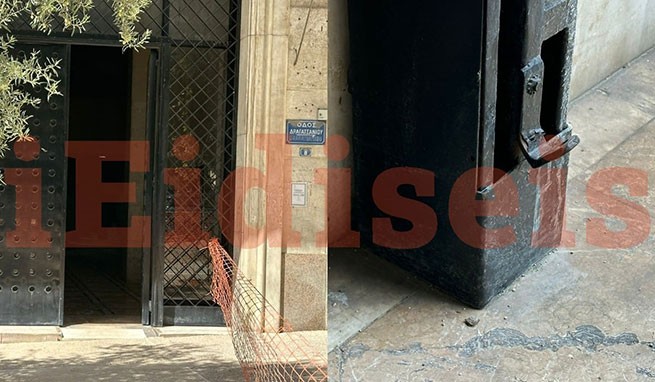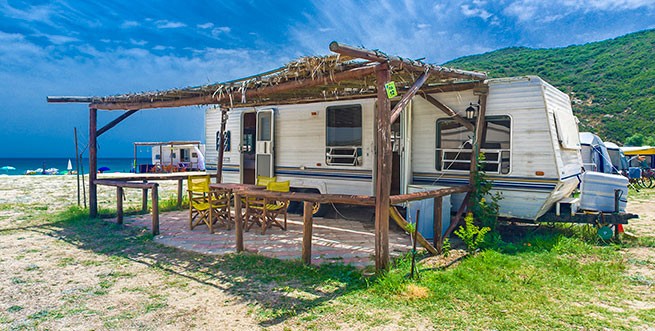In the current greenfield planning boom, with some councils still issuing planning permission and others not, many owners are turning to to motorhomes and mobile homes alternatively, trying use the landwhich they own, and thus put a barrier to the depreciation of their assets.
At the same time, tens of thousands of property owners in unplanned areas of the country continue to see their properties sitting unused as the temporary regulation on unfinished construction remains “frozen” until further notice in 2025.
These people believe that in this way they are circumventing the law that requires a building permit. Many of these property owners believe that they can legally install caravans and mobile homes without the need for planning permission.

Where did they get this belief from?
There is a saying among the country's residents point of view (actively fueled, among others, by sellers of motorhomes and prefabricated houses), that since these (mobile) structures are not stationary, they can be transported and installed on the ground without carrying out work using building materials, such as reinforced concrete, brickwork, etc., they are not full-fledged housing, for which a permit is required.
However, this is not the case, since according to urban planning legislation, any structure located on land requires a building permit. And it is for this reason that interested parties, before purchasing and placing any building on their property, should contact an engineer to establish the legality or incorrectness of their project.

The Athens News, with the help of surveyor and urban planner Gramatis Baklatsis, presents through 10 questions and answers regarding all the information that should be kept in mind by those interested in placing a mobile home on their property, to avoid penalties.
- What are the legal conditions for placing a mobile home on a plot/lot?
Temporary placement of a caravan is permitted if it has a valid permit from the Ministry of Transport for movement. In addition, it has a registration number and is towed by a passenger car. A mobile home can be placed on a private plot if it is not a designated archaeological site, sea, beach or forest area. - What should stakeholders know?
Motorhomes must be on wheels and have a road sign (usually). If they are “grounded”, i.e. immovable, then we are talking about a stationary building. For example: if you removed the wheels from a motorhome and closed the side gap with bricks or tightly fixed boards, then this house is already legally turns into a stationary house. - Is it possible to connect a motorhome to water and electricity networks?
Motorhomes that are not moving vehicles and are towed by vehicles with a registration number (e.g. so-called mobile homes) of the Ministry of Transport, provided that they are converted into installations with a permanent dependence on the environment in which they are installed and are permanently connected to it (e.g. a fixed connection), are installed on the ground with the construction of a cesspool, connection to networks or serve for the habitation of people or animals, the performance of work or occupation, storage or placement of things, equipment, etc., to be installed on a field or land plot, they must have permission from the authority responsible for issuing building permits. - Can a caravan owner be given a small permit to build a concrete base, gazebo, fence or cesspool? No. Such structures as a concrete foundation, retaining wall, sheds, cesspool, etc. fall under the provisions on unauthorized construction. It is allowed to build a gazebo without a permit up to 50 m2, but there must be a legal place of residence on the site.
Also, small soil formations up to plus/minus 0.80 meters from the natural soil using natural bulk materials are not covered by the concrete foundation, which is allowed without planning permission under the planning legislation. As is the concrete fencing. Even a cesspool and any underground tank require planning permission. - What about mobile homes?
The term “mobile home” does not exist in urban planning legislation. A mobile home is also a trailer-type wheeled structure, subject to all laws and regulations of the Ministry of Transport on trailers. It is owned and controlled there.
It must have its own number plate, wheels, so that it can park on any private property (subject to the availability of the appropriate parking permit) and move around the property at the request of the competent authority.
However, in no case a mobile home does not qualify as a home And cannot be supplied electricity (even if photovoltaic panels are installed instead of connecting to the power transmission line, which is incomprehensible in principle) or legally provided with water.
If it is firmly connected to the ground (wheels removed or sewerage connected, etc.), then it is already considered a permanent building and is under the control of the urban planning authorities. Anything that is not a mobile home and has a permit from the Ministry of Transport is considered permanent and requires a building permit (Circular 34/1988). - Is it possible to get a building permit for a mobile home?
No. Because anything that isn't a mobile home with a permit from the Department of Transportation is considered permanent and requires a building permit. However, the mobile home does not fall under the category of prefabricated housesfor which a building permit may be issued under certain conditions. - Why won't the Department of Urban Development issue a permit for the construction of a mobile home?
According to ΝΟΚ, construction is any safe technical project that has specific requirements for sustainability, hygiene, insulation, materials, etc., in accordance with the Integrated Energy Design of Buildings (KENAK).
A mobile home is not subject to these regulations because it is a lightweight structure. It is usually made with a wooden or metal frame. For the inner surface, plasterboard or plywood is mainly installed, and on the outside, either plywood (or its analogues) or aluminum sheets are used. - What is a mobile home?
A mobile home is a house on wheels and is often referred to as a “mobile home”. However, the fact that it is on wheels does not mean that it is a type of motorhome (caravan) used for travelling, and it is certainly not a means of transportation. Instead, it is a stable and permanent solution for accommodating people. - Mobile homes are allowed all over Europe. Why are they banned in Greece?
Because when designing buildings, the living conditions, weather conditions, and seismicity of each area are taken into account. Since these structures are in great demand in Northern European countries, they are built according to their own standards, which are not used in Greece. (A stupid excuse – why? See point 10). - Many builders/suppliers advertise mobile homes online that they claim do not require planning permission. Is this applicable?
Indeed, there are many imported structures of this type, which are even accompanied by import documents and other certificates about how they were built. But be careful! When they are placed on the site and connected to the sewerage and water supply, they are characterized by, as arbitrary development and are controlled by urban development authorities (this means that point 9 can be interpreted in different ways – there is a certificate, which means it is possible, no, which means it is not possible).







More Stories
"Modernizing my home": when will the program be "launched"who will be affected
From October 1st they change "hours of silence": what not to do, punishment for violation
Real Estate: Everything You Need to Know About Owning a Home When a Landlord Can "evict" tenant